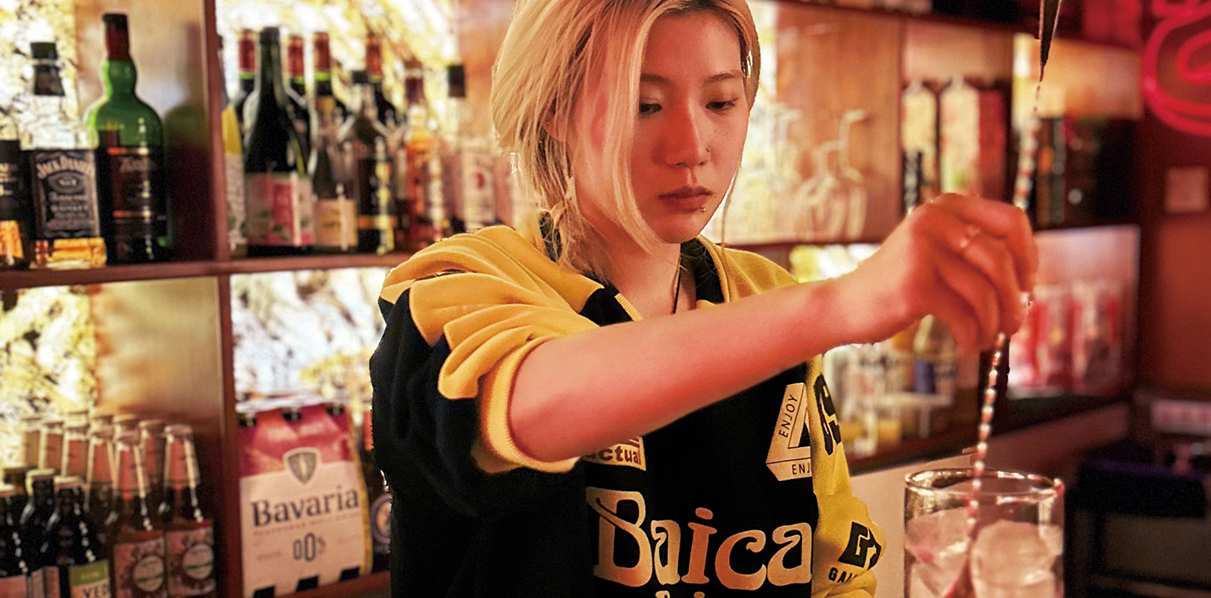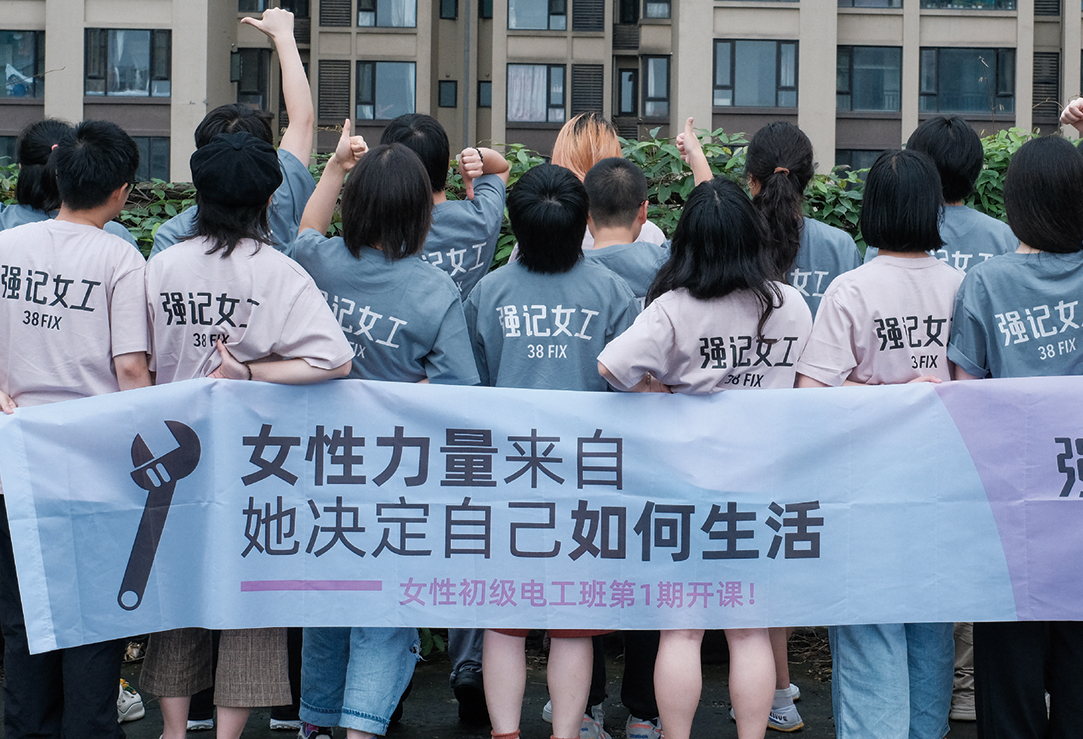Women-only businesses in China are empowering women by creating supportive spaces that challenge traditional norms and foster community, Meng Wenjie reports.

In a bar in Beijing's Haidian district, a group of women gather to discuss the newly released Chinese feminist film Her Story. This bar, called Second, is a women-only space, with women not only as patrons but also as founders and bartenders.
Meng Qingdi, 30, one of the bar's founders, explained that women often feel uncomfortable due to unwanted attention in traditional bars. An all-women bar, however, creates a safer, more relaxed environment, allowing female patrons to truly unwind.
"I want this place to feel like a second home for our customers, where they can relax as they would at home," Meng said, explaining the inspiration behind the bar's name.
Feminism is increasingly shaping various aspects of Chinese society, and one notable development is the rise of women-only businesses, including bars, gyms, bookstores, and renovation teams. A closer look at this trend reveals bold and inspiring examples of women challenging traditional male dominance.
READ MORE: Unleashing financial freedom for young women
In March of this year, Meng and her friend Zhang Huilin opened the first Second bar in Beijing's Chaoyang district. By July, they had expanded to a second location in Haidian, bringing on a new partner, 32-year-old Lan Ya.
Lan fondly recalled a visit from two young women celebrating their first bar experience with their mother, while their father waited outside. They enjoyed their time with other female patrons, creating a warm and supportive atmosphere.
The bar has been constantly innovating to meet the needs of its female clientele. For example, it provides shared makeup kits and feminine hygiene products such as sanitary napkins. Non-alcoholic drinks are also available, starting at just 6 yuan ($0.83).
"Many traditional bars avoid offering soft drinks due to lower profit margins," Lan explained.
The bar also hosts weekly events, such as screenings of female-focused films and discussions on trending feminist topics.
"Most of our customers are college students," Lan said. "These women-centered exchanges help them see that their struggles and viewpoints are shared by others their age, making them feel less alone."
For the bar's all-female staff, unique policies have been introduced, including a monthly menstrual leave day.
Enduring no more
Kong Meiying, 36, opened a women-only gym in Tianjin's Binhai New Area in 2020, at a time when the concept of women-only businesses was still relatively uncommon.
As a former coach at a gym where 95 percent of her clients were women, Kong noticed the unique challenges women often faced in mixed-gender gyms: many of them felt self-conscious wearing form-fitting workout attire due to the gaze and comments from men and often limited themselves to cardio exercises as a result.
At Kong's gym, women can focus on strength training without worrying about being stared at. The gym also implements thoughtful measures, such as extending monthly memberships by seven days to accommodate women's menstrual cycles.
"I want to provide a supportive and fair fitness space for women, where they can enjoy their workouts and feel comfortable in their gym attire," Kong explained.
When Kong first proposed the idea of a women-only gym, many of her family and friends were skeptical about its success. However, her professionalism quickly earned the trust of her clients.
By 2022, with the support of a loyal customer base, Kong opened a second gym in downtown Tianjin, which soon gained popularity as well.

Fixing it myself
Li Xiaoxiao, a 33-year-old from Chengdu, Sichuan province, is addressing the everyday challenges faced by women.
In April, she launched a social media account called "Qiangji Women Workers", through which she offers free tool rentals to women in Chengdu.
Li designed the platform's logo with a creative twist, using the numbers 3 and 8 to symbolize International Women's Day. Together, the numbers form the Chinese character qiang, meaning "strength", echoing the name "Qiangji".
However, Li soon realized that access to tools alone wasn't enough — women also needed the skills to use them.
In July, she organized a 10-day repair training program exclusively for women. The course, which combined theory and hands-on practice, quickly filled to capacity, with half of the participants traveling from outside Chengdu to attend.
Li later expanded her initiative by recruiting some of her certified trainees to establish a women's repair team, breaking into a field traditionally dominated by men.
Reflecting on her experience, Li noticed that women are often stereotyped as patient and good communicators — traits that can become limiting.
"I don't want women's strengths to turn into social constraints on their career development," she said. "If a female repair worker isn't as patient, would people be less tolerant of her than they would be of a male worker? That's not fair."
Thriving through doubt
Women-only businesses are often met with skepticism. Li, for instance, has been the target of personal attacks online, with critics questioning whether her efforts to empower women are driven by profit. Despite this, she remains confident that her sincerity will be recognized over time.
"Women consumers are very perceptive, and entrepreneurs with insincere motives will eventually be pushed out by the market," she said.
When women-only businesses fail, they also tend to attract harsher criticism.
Fanfan (pseudonym), 24, launched a women's co-living community in May 2023 with two female friends. They rented a five-room villa in Nanjing, Jiangsu province, offering female tenants a unique shared living experience.
"We wanted to create an environment where women could truly be themselves, while also easing the financial and emotional burdens they often face when looking for a safe place to live," she said.
Initially, the community drew many young women from other regions during the summer, but visitor numbers dropped sharply after the holiday season ended. The business also faced online misogynistic attacks.
Struggling financially and under mounting pressure, the startup closed in early 2024.
ALSO READ: Targeted policies for women could contribute to equality
Fanfan's experience is not unique. Recently, several women-only businesses in Beijing have shut down, raising concerns about the sustainability of such business models.
Meng and Lan attribute these closures to various factors, including a lack of entrepreneurial experience and poor planning — issues unrelated to gender.
Li agreed. She said that when women-only businesses fail, people tend to focus on gender instead of the underlying issues. "Countless startups fail every day, and that's not surprising," she explained.
Despite the setbacks, Fanfan remains active in the female-focused entrepreneurial space. She has since opened a women's bar in Nanjing and is working to promote women's products like period underwear, which are still relatively new to the Chinese market.
"Women's growing awareness has opened up a whole new world of possibilities for me," Fanfan said. "Still, few businesses truly address these emerging needs. I want to carve out my own space in this new landscape, even if it means starting from scratch and challenging the old rules."
Contact the writer at mengwenjie@i21st.cn


